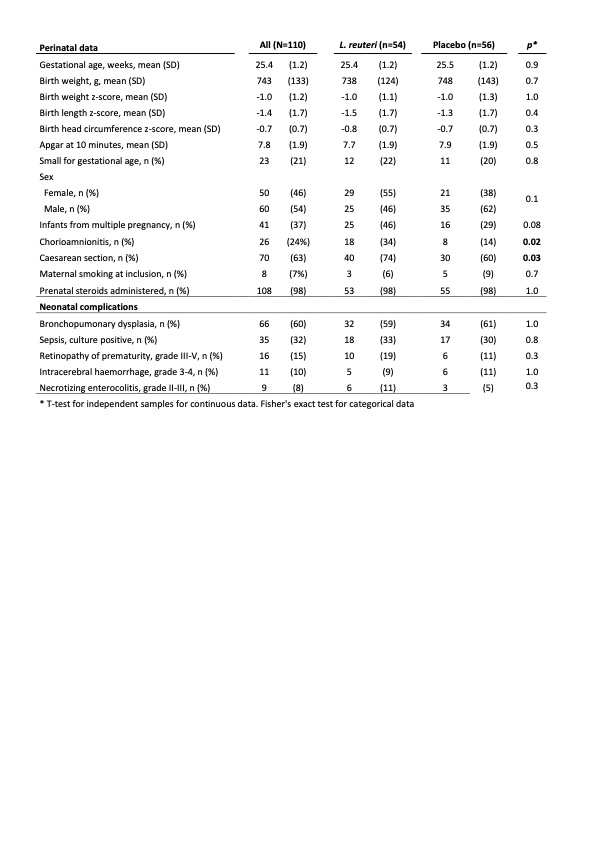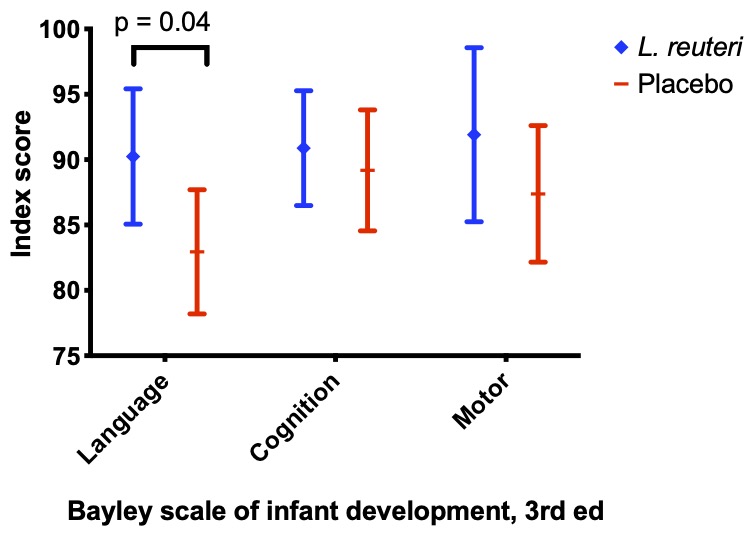Neonatal Follow-up
NICU Follow Up and Neurodevelopmental 2: Neonatal Growth, Nutrition and the Brain
213 - Probiotics to extremely preterm infants promoted language development until 2 years of age in a randomized-controlled trial
Publication Number: 213.144

Erik Wejryd, MD PhD (he/him/his)
Consultant
Linköping University
Åby, Ostergotlands Lan, Sweden
Presenting Author(s)
Background:
Long term developmental problems after extremely preterm birth (EPT, i.e. < 28 gestational weeks) and of extremely low birth weight (ELBW, i.e. < 1,000 g) cause significant disabilities. There is an association between poor postnatal head growth and adverse neurodevelopmental outcome. We previously reported that neonatal probiotic supplementation with Limosilactobacillus reuteri DSM 17938 to EPT+ELBW infants was associated with a significantly improved head growth during the first 28 days of life.
Objective:
The objective was to test the hypothesis that neonatal oral supplementation with L. reuteri to EPT+ELBW infants improves neurodevelopment and growth until two years of age.
Design/Methods:
This was a follow-up after a previous trial (ClinicalTrials.gov ID NCT01603368), where neurodevelopment at 2 years of age was a secondary outcome. Newborn EPT+ELBW infants at two tertiary neonatal intensive care units in Sweden had been randomized in 2012 – 2015 to receive daily oral supplementation of either placebo or L. reuteri (2,5 x 108 colony forming units), starting within 72 h and ending at gestational week 36. Infants were exclusively breast milk fed until reaching 2 kg. Donor milk was provided if needed. Infants were assessed at 24 ± 3 months corrected age using the Swedish program for neonatal follow up, including auxology, Bayley-III testing by psychologist, standardized neurologic examination by pediatrician or physiotherapist, and screening for autism using the M-CHAT questionnaire. Data from the follow up was obtained from the Swedish Neonatal Quality register (SNQ).
Main outcomes were Bayley-III assessment and auxology.
Results:
Out of 134 infants included in the neonatal trial, 110 infants were assessed at 24 ± 3 months. Mean gestational age was 25.4 weeks, mean birth weight 743 g. Mean (95% CI) Bayley-III language index score was higher in the probiotic group compared to controls (90.0 [85.0 - 95.1] vs 83.0 [78.3 - 87.7]; p=0.04). No statistically significant differences were found in cognition or motor index; auxology measured as mean z-score change from birth for weight, height, and head circumference; M-CHAT scores; or a compound neurodevelopmental impairment assessment.
Conclusion(s):
Neonatal probiotic supplementation with L. reuteri was related to better results on language assessment at 24 ± 3 months corrected age in children born extremely preterm with extremely low birth weight, which may indicate a beneficial effect on neurodevelopment.


.jpg)
